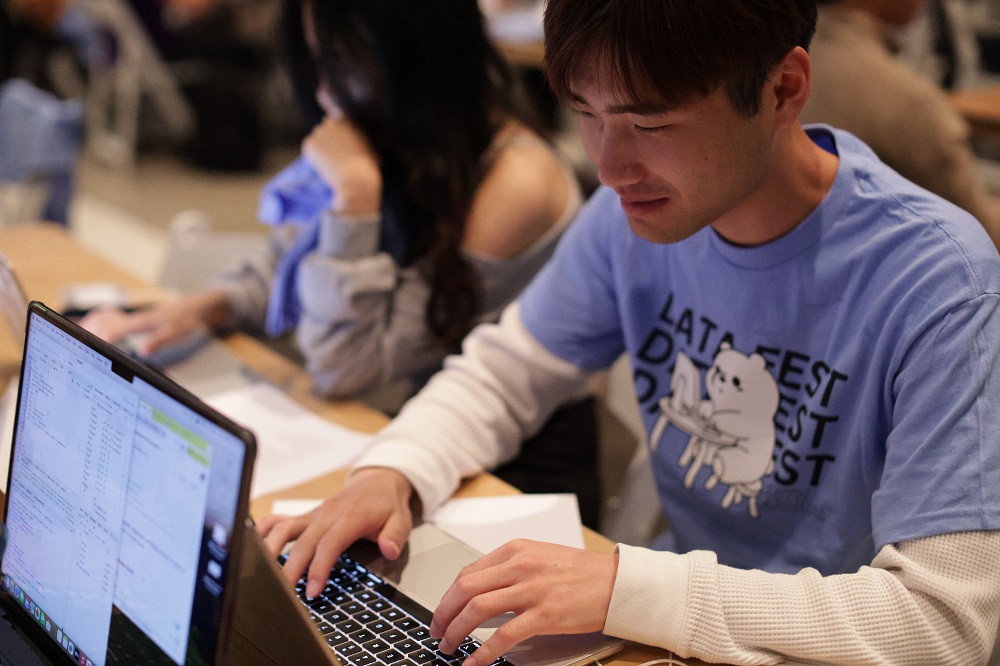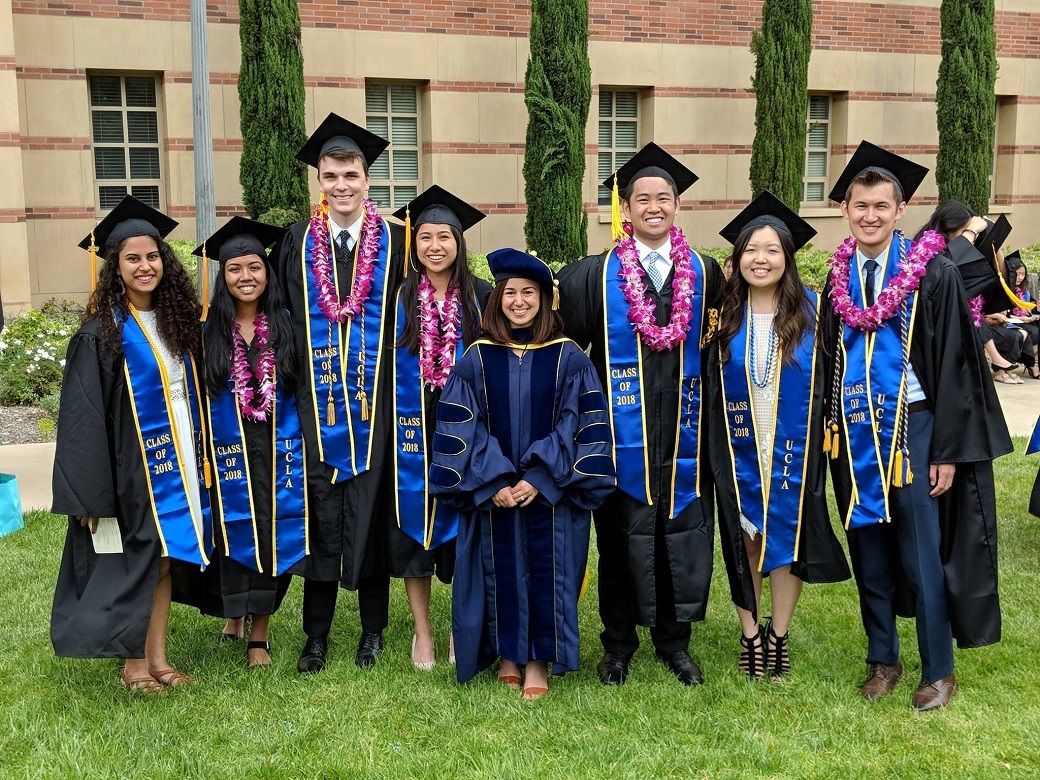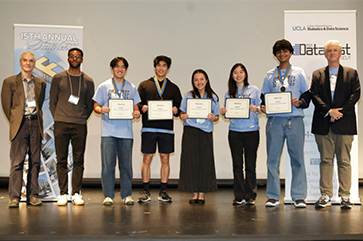Classroom to community: celebrating 15 years of student success at UCLA’s DataFest hackathon
Giving students the spotlight, the annual event has inspired a far-reaching data science tradition on campus and beyond
UCLA’s 15th annual undergraduate data analytics competition, ASA DataFest at UCLA, took place April 25–27 on campus. Founded by teaching professor of statistics and data science Robert Gould in 2011, it’s known today as the largest data hackathon on the West Coast. Watch the recap video to relive the excitement with Gould, associate director Linda Zanontian and almost 400 student participants.
Lucy Berbeo | May 7, 2025
The following story was originally published at UCLA Newsroom.
Halfway into his 30-year career as a teaching professor of statistics and data science at UCLA, Robert Gould had a problem to solve. Students readily grasped core concepts and aced exams, he remembers — but they were missing something key.
“We wanted students to work with real data, take ownership of their work and see their potential to make an impact outside the classroom,” said Gould, who joined UCLA in 1994 and became one of the inaugural members of what is today the UCLA Department of Statistics and Data Science. “Hackathons were making headlines at the time, and I thought: ‘What if we got students together for an intense weekend where they could focus on one real-world problem and offer solutions?’”
And then, as it happened, the real world came knocking. In 2011, as organizations of all kinds became increasingly data-driven, the Los Angeles Police Department contacted UCLA in search of ways to better understand its own data. “I reached out to the officer in charge, and he was excited about getting some data in front of students and seeing what they could do,” Gould said.
The result: the American Statistical Association DataFest at UCLA, an undergraduate data analytics competition where teams of students have 48 hours to analyze a large, complex dataset and provide meaningful insights. Founded and directed by Gould, who led the 15th annual event on campus April 25–27, DataFest has garnered ASA sponsorship, spread to other top U.S. universities and even attracted international participation. Organizations from the American Bar Association to the Yale School of Medicine to Indeed have contributed datasets and benefited from students’ findings.

Damon Cirulli
Working around the clock in teams, DataFest participants analyze a real-world dataset — one more complex than any they’ve encountered in the classroom — before presenting their findings to a panel of judges, vying for prizes including best insight, best visualization and best use of external data.
From the outset, Gould says, students eagerly embraced the challenge. Today, around 400 undergraduates participate at UCLA each year, including Bruins as well as students from other schools across Southern California. Assembled in teams with creative names like “Stat Pack” and “Standard Deviants,” they spend weeks sharpening their skills ahead of the competition.
True to its name, DataFest is also a celebration that brings a far-reaching, dedicated data science community to UCLA’s campus each year. Graduate students, faculty, alumni and industry professionals alike join as consultants, judges and supporters. During the 48-hour sprint after the dataset is revealed, the undergraduate contestants are not alone: Volunteer mentors walk around the room so student teams can flag them down when they have questions. Sponsors set up booths, and students have the opportunity to talk to recruiters and share their resumes.
Over time, the broader DataFest community’s ripple effect has found its way back to Gould and his colleagues.
“I meet people in the data science industry who tell me, ‘Oh, I participated in DataFest when I was in college, and that’s why I’m doing this work today,’” Gould said. “It’s really a thrill to hear stories like that.”
Creating a virtuous circle, alumni play a major role in UCLA’s ongoing DataFest success. Linda Zanontian, a continuing lecturer in statistics and data science who earned bachelor’s, master’s and doctoral degrees from UCLA, has been a driving force behind the event since it launched when she was a graduate student. Today, as associate director of ASA DataFest at UCLA, she advises the undergraduate planning committee (see sidebar) and maintains strong ties with DataFest alumni, many of whom are excited to return as mentors and supporters.

Courtesy of Linda Zanontian
Continuing lecturer and ASA DataFest at UCLA associate director Linda Zanontian (center, with the 2018 DataFest student committee) holds three degrees from UCLA: a B.S. in mathematics/applied science and an M.S. and Ph.D. in statistics. “She’s the glue that holds DataFest together,” said current committee co-chairs Kowen Jeong and Irene Zhang.
“I’ve loved the mission of DataFest since day one — it’s an amazing way to connect with our undergraduate students and give back to them,” Zanontian said. “Our alumni share that mission, and it makes me so happy to know that they truly had a great experience during their time with us and can’t wait to come back.”
Alumni help with another vital component, too, Gould says: obtaining the dataset itself each year, which is no simple feat.
“They’ve been coming through for us — some of our alums have now been at their positions for 15 years and are in a place where they can say, ‘Hey, we’ve got a great dataset we’d love for students to work on,’” Gould said. “So that’s really helped us to keep moving forward.”
Gould hopes UCLA’s DataFest will continue to grow, ideally building capacity to work with nonprofits that lack the means to conduct their own data analysis. He’d like to find new ways to serve students, particularly those from non-STEM majors, who already represent a sizable portion of participants.
For now, looking back at this year’s anniversary, UCLA’s entire DataFest team is excited to pay special tribute to a phenomenon born on campus and now ingrained in data science culture at UCLA and beyond.
“DataFest is a proud UCLA tradition, and for good reason. It positions our students as leaders and problem-solvers capable of contributing to society in new and significant ways,” said Miguel García-Garibay, senior dean of the UCLA College and dean of physical sciences. “As we celebrate this milestone, I am thrilled to recognize our brilliant students and the dedicated Bruin family and friends who, year after year, make this meaningful experience possible for so many.”
Learn more about ASA DataFest at UCLA at datafest.stat.ucla.edu.




